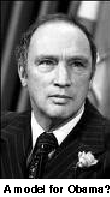 The progress of civilization is largely about the progress of rights. The Spanish parliament has now made a logical next step in that progress. It has passed a resolution that would extend rights to our fellow great apes -- bonobos, chimpanzees, gorillas and orangutans. The resolution has cross-party support and is expected to become law. In addition to preventing experimentation on great apes, it will ban their use use in circuses or filming and conditions in zoos will have to be improved substantially.
The progress of civilization is largely about the progress of rights. The Spanish parliament has now made a logical next step in that progress. It has passed a resolution that would extend rights to our fellow great apes -- bonobos, chimpanzees, gorillas and orangutans. The resolution has cross-party support and is expected to become law. In addition to preventing experimentation on great apes, it will ban their use use in circuses or filming and conditions in zoos will have to be improved substantially.The measure is inspired by the Great Apes Project, an international group founded in 1993 by philosophers Peter Singer and Paola Cavalieri "to work for the global removal of non-human great apes from the category of mere property, and for their immediate protection through the implementation of basic legal principles designed to provide these amazing creatures with the right to life, the freedom of liberty and protection from torture."
In the past two centuries, we have made many advances in the realm of moral legislation. We have ended slavery, extended the vote to all citizens, recognized women as the equals of men, spared children from exploitive labour, freed minorities from the bonds of prejudice, and rescued homosexuals from the criminal code. It would now seem time to stop treating highly sentient beings other than ourselves as nothing more than property. Science has firmly established the proximity of their sentience to ours.
Morally, we have traditionally divided animals into two groups -- us and the other -- a very high standard for us and a very low standard for them, as if a vast gulf lay between us. Now we know that isn’t true. As the Great Ape Project states, the non-human great apes share with us "a rich emotional and cultural existence in which they experience emotions such as fear, anxiety and happiness." They are deserving, therefore, of similar respect and protections. A sharp dichotomy is no longer justified. Without suggesting they should be our legal equals, they must, on scientific and moral grounds, be drawn more closely to us. The Spanish resolution is an important step in this direction. According to Pedro Pozas, Spanish director of the Great Apes Project, "This is a historic day in the struggle for animal rights and in defence of our evolutionary comrades which will doubtless go down in the history of humanity." Let's hope Mr. Pozas is right. And the idea catches on.



